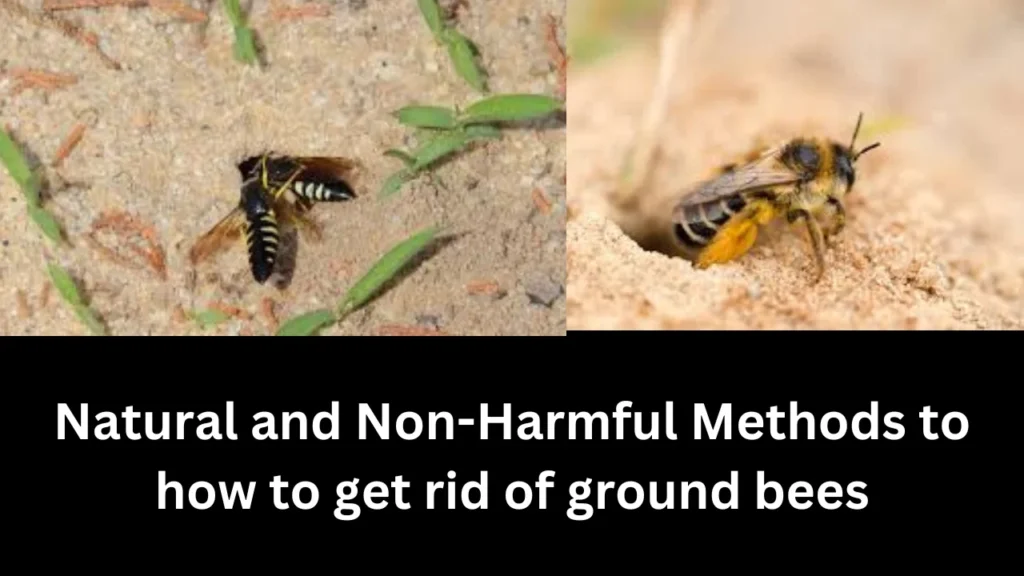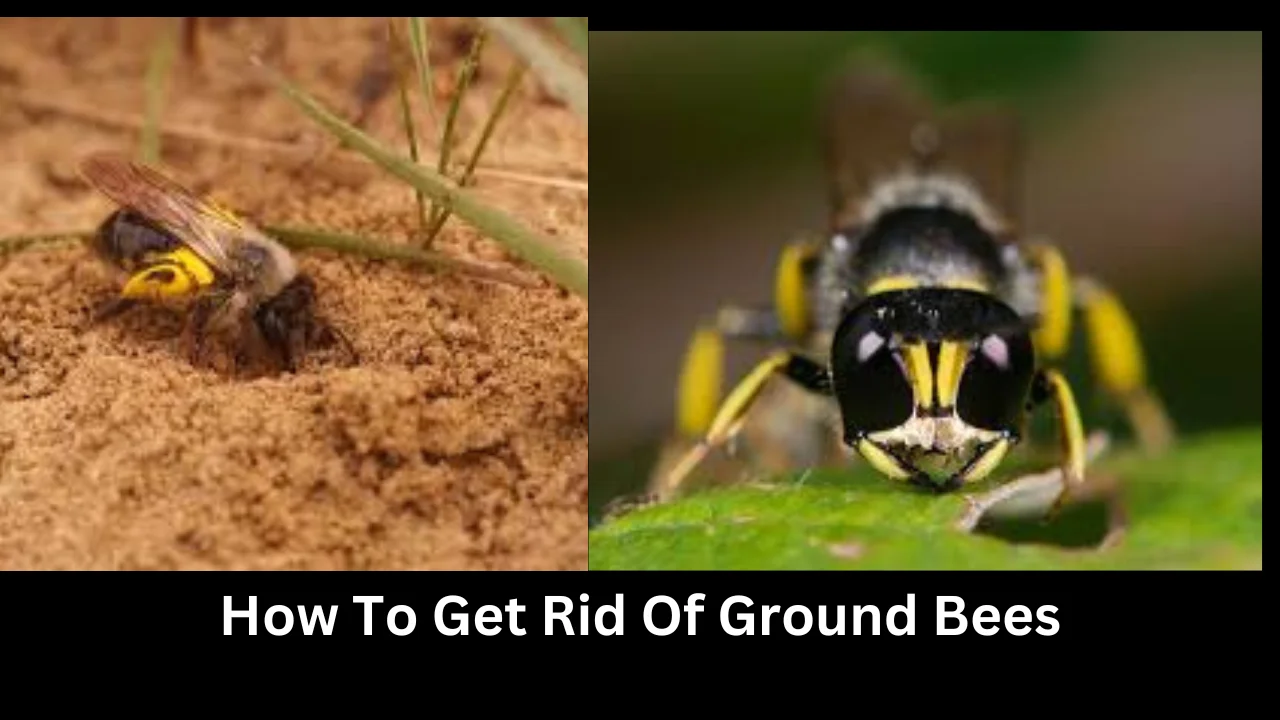Ground bees are often beneficial to the environment, pollinating plants and flowers. However, they can also become a nuisance when they burrow in your yard, garden, or other outdoor spaces. Understanding how to get rid of ground bees safely and effectively is essential, especially if you want to avoid harming these helpful pollinators while protecting your home and family.
What is how to get rid of ground bees
How to get rid of ground bees refers to the methods and techniques used to safely and effectively remove ground-nesting bees from an area. Ground bees, also known as mining bees, typically nest in dry, sandy soil and can become a nuisance if their burrows are in high-traffic areas of your yard or garden. While these bees are generally non-aggressive and beneficial for pollination, their presence can still be disruptive.
Identifying Ground Bees
Before taking any action, it’s crucial to understand what type of bees you’re dealing with. Ground bees, also known as mining bees, are solitary creatures that typically nest in dry, sandy soil. They are often confused with wasps or yellow jackets, but ground bees are generally non-aggressive and do not pose the same threat. Unlike honeybees or wasps, ground bees don’t live in colonies. Instead, each female digs her own nest, which can make their burrowing less noticeable unless there are many bees in your yard.
Key characteristics of ground bees:
Small mounds of soil near holes in the ground
Presence of bees flying low around these holes
Bees about 1/4 to 1/2 inch in size
If you’re sure the insects are ground bees, it’s time to figure out how to get rid of ground bees in a safe and effective manner.
Why You Should Consider Removal Carefully
Ground bees are essential pollinators, playing a role in maintaining ecosystems by helping plants reproduce. Although their presence may be alarming, it is vital to recognize their environmental importance before deciding on removal.
Instead of rushing to eliminate them entirely, consider leaving them undisturbed, especially if their nesting area is in a corner of your yard that doesn’t interfere with your daily activities. In most cases, they pose little threat. However, if they are nesting near doorways, children’s play areas, or high-traffic zones, removal may be necessary to reduce the risk of accidental stings.
Natural and Non-Harmful Methods to how to get rid of ground bees

If you’re wondering how to get rid of ground bees without using harsh chemicals or hurting the bees, there are several natural and humane methods to try.
Watering the Area
Ground bees prefer dry, sandy soil for nesting. By keeping the area moist, you can discourage them from nesting. Watering your lawn or garden regularly is one of the easiest and safest ways to make the environment less favorable for bees. Since ground bees do not like damp soil, they may leave on their own after a few weeks of consistent watering.
Mulching
Another method to deter ground bees from nesting is by applying a thick layer of mulch over the affected area. Mulch retains moisture and alters the soil’s texture, making it unsuitable for ground bees to dig their nests. This can be especially effective in gardens or areas where you want to prevent ground bees from returning next season.
Citrus Spray
A DIY citrus spray can help to drive bees away without harming them. To make the spray, boil water with citrus peels (lemon or orange work best) and allow it to cool. Once the solution is ready, spray it around the bee nesting holes. Ground bees are sensitive to strong odors, and the citrus scent can encourage them to leave.
Vinegar Solution
A mixture of vinegar and water can also work to repel ground bees. Vinegar is a natural deterrent for many insects, including bees. Mix equal parts water and white vinegar in a spray bottle, and apply the solution directly to the bee burrows.
Block Off Access How to get rid of ground bees
Can be as simple as preventing access to their nests. Blocking the entrance to the nests with soil, sand, or even rocks can cause the bees to relocate. Once the bees realize they can no longer enter their burrows, they will seek a new nesting site elsewhere.
Chemical-Free Remedies to Consider
In some cases, how to get rid of ground bees may require a more structured approach, particularly if natural methods do not yield results. If the bees persist and pose a serious problem, consider these chemical-free remedies:
Essential Oils:
Certain essential oils, like peppermint or tea tree oil, are known to deter bees. Dilute the oil in water and spray it around the affected areas.
Garlic Powder:
Ground bees dislike the smell of garlic. Sprinkling garlic powder near the burrows can make the area unattractive for nesting.
These options can provide a more direct solution, especially in high-traffic areas where ground bee nests may become problematic.
When to Call a Professional
If you’ve tried natural methods and the bees are still present, or if you have an allergy to bee stings, it may be wise to call a professional. Pest control experts can help you understand how to get rid of ground bees safely without risking harm to yourself or the bees. Many professionals offer environmentally friendly solutions that focus on relocating the bees rather than exterminating them.
While DIY methods are often effective, pest control services can offer peace of mind by thoroughly assessing the situation and ensuring the bees do not return.
Comparing Different Methods for Ground Bee Removal
To summarize, let’s compare the effectiveness of each method based on the situation:
| Method | Best For | Effectiveness | Impact on Bees |
|---|---|---|---|
| Watering | Low-intensity infestations in gardens or lawns | Moderate | Harmless |
| Mulching | Preventing future nesting | High | Harmless |
| Citrus Spray | Removing bees from small areas | Moderate | Non-lethal |
| Vinegar Solution | Disrupting nests | Moderate | Non-lethal |
| Blocking Holes | Directly forcing bees to relocate | High | Harmless |
| Essential Oils | Deterring bees without direct contact | Moderate | Non-lethal |
| Professional Help | Large infestations or safety concerns | High | Varies |
Each method works differently depending on the size of the infestation and the area where ground bees are nesting. For small, isolated nests, natural methods are often enough. However, for larger infestations, professional assistance may be the most effective solution.
Long-Term Prevention Tips
Once you’ve learned how to get rid of ground bees, it’s important to take steps to prevent them from returning. Ground bees are likely to nest in the same area year after year, so implementing preventive measures is essential. Consider:
Maintaining Lawn Moisture:
Keeping your lawn well-watered can deter bees from nesting in the future.
Sealing Holes and Gaps:
Regularly inspect your lawn or garden for signs of burrowing and block any holes you find.
Planting Bee-Repelling Plants:
Some plants, like eucalyptus, mint, or citronella, can naturally deter bees from nesting in your yard.
By following these preventive strategies, you can reduce the risk of ground bees returning and maintain a bee-free environment throughout the year.
Frequently Asked Questions
Are ground bees dangerous?
Ground bees are generally non-aggressive and rarely sting unless provoked. They are beneficial pollinators and pose little threat to humans.
How can I naturally get rid of ground bees?
Watering the soil, applying mulch, or using citrus or vinegar sprays are natural ways to deter ground bees without harming them.
When should I call a professional for ground bee removal?
Call a professional if the infestation is large, in a high-traffic area, or if you have bee allergies and want to ensure safe removal.
Conclusion
Ground bees are important to the ecosystem, but sometimes their nests can interfere with daily life. By learning how to get rid of ground bees, you can safely manage these insects without harming them. Whether you choose to use natural deterrents like water and mulch or decide to consult a professional, it’s essential to approach bee removal with care. With the right strategies in place, you can protect your home while respecting the important role bees play in the environment.
